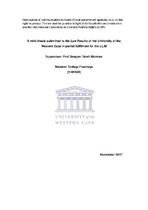| dc.contributor.advisor | Mezmur, Benyam Dawit | |
| dc.contributor.author | Fesehaye, Natsinet Tesfaye | |
| dc.date.accessioned | 2018-04-10T08:35:03Z | |
| dc.date.available | 2018-04-10T08:35:03Z | |
| dc.date.issued | 2017 | |
| dc.identifier.uri | http://hdl.handle.net/11394/5906 | |
| dc.description | Magister Legum - LLM | |
| dc.description.abstract | The right to privacy is recognised as one of the most important individual
rights. It is considered to be central to the protection of one's human dignity. It
also forms the basis of any democratic society. Furthermore, it is linked to
other basic rights, including the rights to freedom of expression and of
association.1 The right to privacy is contained and recognised in almost every
constitutional bill of rights and major international and regional conventions.2 It
is also guaranteed expressly in the Universal Declaration of Human Rights,3
the European Convention on Human Rights,4 the American Convention on
Human Rights5 and a number of countries' constitutions.6 The Convention on
the Right to the Child recognises the right to privacy of the child.7 | |
| dc.language.iso | en | |
| dc.publisher | University of the Western Cape | |
| dc.title | Interception of communication by South African government agencies vis-a-vis the right to privacy: The law and the practice in light of the South African Constitution and the International Convention on Civil and Political Rights (ICCPR) | |
| dc.rights.holder | University of the Western Cape | |

